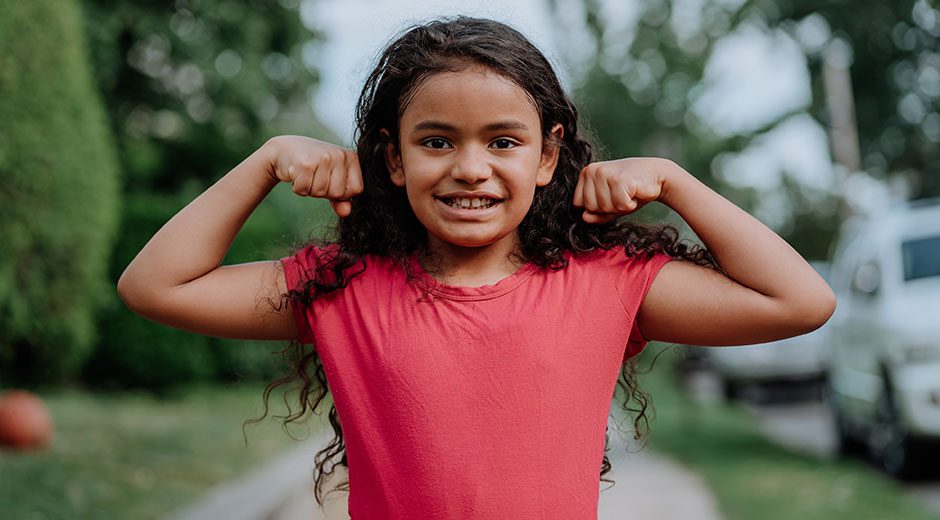Like A Girl
In doing research for my blog post on Women’s History Month, I came across a video campaign by Always titled, “#LikeAGirl”. In the video, girls and boys of all ages are brought in individually and asked to run, throw, or fight “like a girl”. Upon being asked this, the older men and women flailed around, giggling and prancing bashfully. However, when younger girls were asked the same question, the results were drastically different. They ran, threw, and fought with full force, as hard as they possibly could. “What does it mean to run like a girl?”, asked the interviewer. The young girl replied, “it means to run as fast as you can.”
At what age does ‘like a girl’ become an insult?
According to Healthychildren.org, children become conscious of the physical differences between boys and girls around age 2. From birth, everything from clothes, toys, hobbies, and television shows are predetermined for children based on their gender. As both a marketing student and babysitter, I have seen this phenomenon at play first hand. Products like baby dolls and accessories are advertised toward girls, while superheroes and monster trucks are advertised toward boys. Gender is often associated with certain personality traits, activities, professions, and colors; which limits children as to what they ‘should’ be. At such an impressionable and developmental age, how do gender stereotypes mold the subconscious mindset and behaviors of children, and what other factors are at hand?
Last fall, I explored the concept of socialization in a course studying global marketing issues and practices. We studied the factors that influence childhood development, such as gender, culture, and media. In Western cultures specifically, age-old stereotypes have depicted women as being exceedingly emotional and nurturing, while men are depicted as strictly stoic and industrious. During socialization, straying from these stereotypical gender norms can often result in bullying and isolation. These stereotypes and narratives projected onto children can additionally lead to issues like misdiagnosis of mental and physical illnesses, and trouble in relationships with self and others.
In a 2017 TED talk by Justin Baldoni, he shared his struggles in overcoming deeply-ingrained stereotypes, and the harmful effects of toxic masculinity.
“For as long as I can remember, I’ve been told the kind of man that I should grow up to be. As a boy, all I wanted was to be accepted and liked by the other boys, but that acceptance meant I had to acquire this almost disgusted view of the feminine, and since we were told that feminine is the opposite of masculine, I either had to reject embodying any of these qualities or face rejection myself. This is the script that we’ve been given. Right? Girls are weak, and boys are strong. This is what’s being subconsciously communicated to hundreds of millions of young boys and girls all over the world, just like it was with me… the only way things will change is if we take a real honest look at the scripts that have been passed down to us from generation to generation and the roles that, as men, we choose to take on in our everyday lives.”
Rather than predetermining the identity and future of a child based on these stereotypes, how can we empower children to have the freedom to express themselves for who they truly are? In a TED talk titled “We Should All Be Feminists,” Chimamanda Ngozi Adichie states:
“The problem with gender is it prescribes how we should be, rather than recognizing how we are. Now imagine how much happier we would be, how much freer, to be our true, individual selves if we didn’t have the weight of gender expectations. What if, in raising children, we focus on ability instead of gender? What if in raising children, we focus on interest instead of gender?”
Take a moment to remember one phrase you were told as a child in relation to your gender. Were you ever told to ‘man up’, or to ‘stop acting like such a girl’? For me, the phrase ‘beauty is pain’ comes to mind. Take a couple of minutes to sit with that thought and explore the ways it might have molded your mindset, your view of yourself, or your view of others. Consider how this phrase may have fed into harmful stereotypes.
So, how can we put an end to these stereotypes? Of course, there is not a one-size-fits-all solution for the deeply-rooted issue of gender inequality and sexism. However, as teachers, you have the advantage and privilege of molding the minds of a future generation. One tool to incorporate healthy gender development in classrooms is by offering a wide range of toys, activities, and educational materials to inspire children that the possibilities of self-expression are endless, regardless of gender. According to KidPowered, gender-neutral toys offer a huge variety of benefits in early childhood development, including enhanced creativity, motor skills, experimental and analytical thinking, and early introduction to STEAM. Professor Blakemore of Purdue states:
“For parents, it’s the same message as for teachers: Strongly gender-typed toys might encourage attributes that aren’t ones you actually want to foster. For girls, this would include a focus on attractiveness and appearance, perhaps leading to a message that this is the most important thing—to look pretty. For boys, the emphasis on violence and aggression (weapons, fighting, and aggression) might be less than desirable in the long run.”
Another way to fight these stereotypes is by creating an environment that encourages healthy gender development. Rather than applauding a boy for his abilities or a girl for their appearance, shift the conversation to providing positive feedback to children based on their individual qualities. Advice from a study done on Healthy Gender Development and Young Children:
“For example, you might say to a child, ‘I noticed how kind you were to your friend when she fell down’ or ‘You were very helpful with clean-up today—you are such a great helper’ or ‘You were such a strong runner on the playground today.’”
So let’s ditch the idea that ‘boys will be boys’…
So let’s ditch the idea that ‘boys will be boys’, and nurture the value of sensitivity and mindfulness within young children. Let’s reinvent the perception of doing something ‘like a girl’, and empower children to have the courage to express themselves and try new things. As educators, role models, and fellow humans, let us stop the narrative of these archaic and harmful stereotypes for the betterment of our children and society as a whole.
Additional Resources:
Become a Teacher. Change Lives.
If you are passionate about impacting the world around you there are few places where you can influence the future as much as a teacher. Teachers have the ability to build students up and set them on a positive course that can have a ripple effect for future generations.
If you are interested in becoming a teacher, check out our online teacher certification process and you could be teaching in a matter of weeks.




